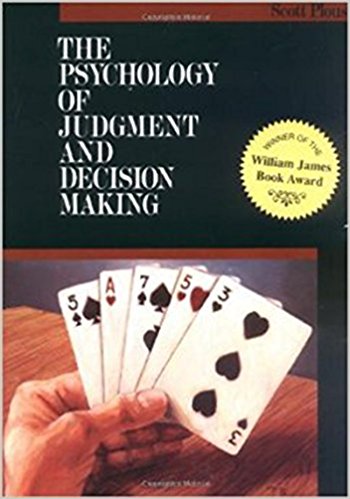 The human nature is accustomed to judge different types of situations, and in the meantime to make decisions.
The human nature is accustomed to judge different types of situations, and in the meantime to make decisions.
We summarize what we think is relevant and informative.
Who Should Read “The Psychology of Judgment and Decision Making”? And Why?
At first, one must come to an understanding that every decision ultimately relies on the previous one, and influences the next one.
Surely, someone will deny this fact, but ask yourself? – Which factors shaped my mindset? – Sooner or later, every individual realizes that the burden of life emerges as a consequence of previous judgments, and choices.
Despite the societal influences, one must be prepared to serve a higher purpose in this world. The most reliable tool at your disposal is your willingness to change!!
The author targets, system analysts, leaders, managers, strategists, researchers, and psychologists who spent a lot of time of analyzing the environmental gaps, in order to improve the decisions.
About Scott Plous
 Scott Plous is an American-born psychologist, author, consultant, with a Ph.D. He momentarily works at Wesleyan University in Connecticut – teaching psychology.
Scott Plous is an American-born psychologist, author, consultant, with a Ph.D. He momentarily works at Wesleyan University in Connecticut – teaching psychology.
Scott is also the founder of Social Psychology Network and has published two books and many articles.
“The Psychology of Judgment and Decision Making Summary”
Every single day, each person faces thousands of choices, and every second is a chance for changing some of those opinions. The social media, internet, tv and other opinion-makers try to entice us with some information, and thereby reshape our mindset.
Sometimes it works, sometimes it doesn’t. In fact, it all depends on the situation, and surroundings. Although this book was published in 1993, it somehow foresaw that the world wouldn’t have a problem with a shortage of information, in years to come.
Many factors (internal and external) influence our decision-making capacity and judgmental attitude. This fact-filled book offers several tips on how to improve not just your managerial abilities, but also the give you a clue in the psychology of judgment.
For centuries people had been under constant pressure from the society, to think, perform, move and judge in a certain way. Perhaps, the time has to come to put an end to that.
The birth of democracy reduced social restrictions and opened thousands of possibilities for people all around the world. Even though this was just the beginning, the profile of an average person changed, instantly.
The digital era offers plenty of solutions, distributed through various channels. The type of information varies from car repairs to supermarket products; all targeting your mind, and its reaction. To put it differently, TV shows and the Internet caused a shift that lasts to this day.
A prodigious amount of research has been done, followed by scientific conclusions, and analyzes on what exactly can improve the decision-making ability.
Regardless of multiple opposing theories, the psychology researchers have come by some mind-blowing scientific conclusions that, transform an average person, from underdog to “superdog”.
All joking aside, the everyday reality encourages us, to look for a way out – mostly referring to the madness of today. As a result of this idea, many concepts rose to the surface, all carrying the fragrance of hope.
For instance, the selective justice system is typical in each country, despite the efforts to fight corruption. People’s judgments are rarely impartial, most of the carry the smell of personal gain, and envy from time to time.
The idea of not having judgment problems is unreal due to the self-orientation arising from the general human inclination. In either case, something needs to be done to at least reduce these “psychological inconsistencies.
In a case of good self-awareness, we probably won’t be having this conversation, but under these circumstances dialog is essential.
Every person is familiar with the cliché phrases like – follow your dreams, trust your vision, accomplish your goals. However, nobody talks about the decision to get there. After all, making the right choices is a piece of cake, or is it?
Well, don’t get too comfortable with any theory, because the psychology of it is not a straightforward matter. People change, situations change, the world changes, so what makes you think, that your perceptions are valid in any circumstance.
The paradox of mixing choices with an open-mindset opposes the conventional methods. On an organizational level, making decisions relies on the structure, but it shares the same issues as the personal one.
You must trust your instinct, and reassure that leadership is a part of your package deal. We firmly believe in the message conveyed through this book; encourages you to give it a try.
Key Lessons from “The Psychology of Judgement and Decision Making”
1. Don’t waste time trying to figure out life
2. Objectivity as tool for improving the decision-making
3. Don’t rely on your memory
2. Objectivity as tool for improving the decision-making
3. Don’t rely on your memory
Don’t waste time trying to figure out life
Life is a mystery, and the quality of life is based on a wide variety of choices that we make on a day to day basis.
Thousands of studies only confirmed this notion and continued with the process to reawaken our hidden potential.
Objectivity as tool for improving the decision-making
The biggest culprit for making irrational decisions consists of biased perceptions and wrongly calculated outcomes.
Scott Plus, the author of “The Psychology of Judgement and Decision Making,” advises that having an alternative is equally important as being good a decision-maker.
Before you move to the next level, you have to be ready to cope with life as it is by adopting an objective point of view.
Don’t rely on your memory
Don’t let anything interfere with open, emotion-free decision making.
Many individuals are still guided by the feeling that memory is a great asset in the journey of becoming a flawless leader or manager.
The past is the past, in fact, past events can only direct you to a place where you wouldn’t want to be at the present moment.
“The Psychology of Judgment and Decision Making” Quotes
Judgment and decision research is conducted by human beings who are prone to many of the same biases and errors as their experimental subjects.The inclusion of a middle category encourages people to choose that category.We do not first see, then define; we define first and then see.Judgment and decision making depend heavily on situation-specific factors, such as how much time a decision maker has available and what mood the decision maker is in.Because judgments are so easily influenced by question wording and framing, the safest course of action is to elicit them in a variety of ways and compare the results.Our Critical Review
This breath-taking masterpiece falls into the category of self-help, meaning that it’s a perfect fit for anyone looking to improve its performance.
“The Psychology of Judgment and Decision Making” acts as a guide that delivers value through various topics.

0 comments:
Post a Comment
Note: only a member of this blog may post a comment.